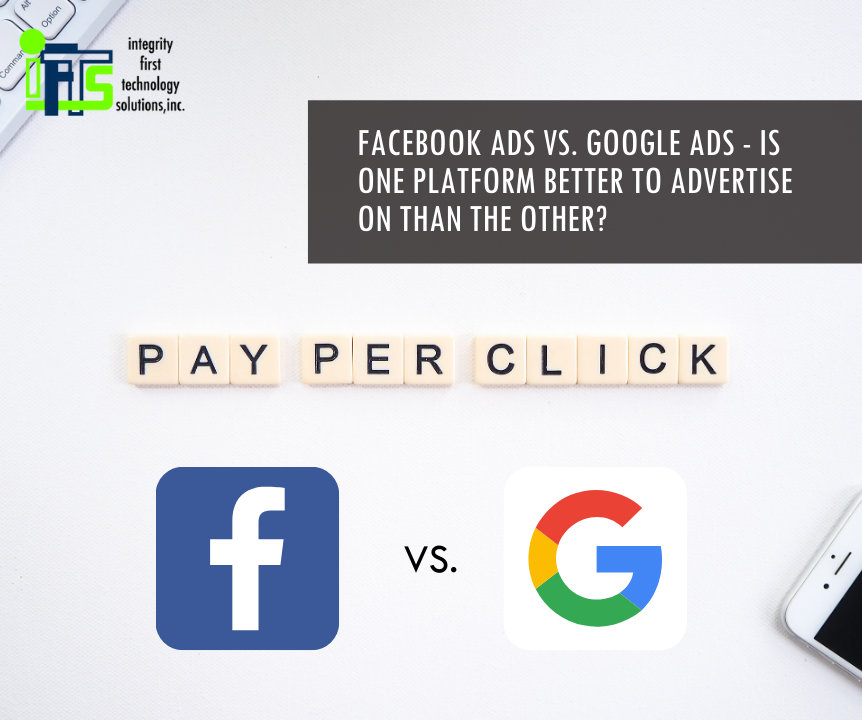
A common question for many business owners when it comes to online advertising is where is my budget better spent?
Google, with over 85% of the search market share, is undoubtedly known as the most popular search engine on the internet as Facebook is the largest social media platform in the world. Both Google and Facebook are valuable places to advertise your business, but for different reasons depending on a few factors.
We all know that both time and money are limited, so where should you start with paid advertising to get the best bang for your buck?
No matter if you’re an expert in pay-per-click advertising (PPC) or if you’re just getting started, this article will help you understand the key differences between Google Ads and Facebook Ads and which is the best fit for you.
What is the Main Difference Between Facebook Ads and Google Ads?
Before we look at the factors that make each of these advertising platforms their own, let’s take a look at the main difference between Facebook ads and Google ads.
Google ads = paid search
As Google is the world’s largest, most popular search engine, it is also the largest PPC advertising platform.
Google ads is a paid search platform working on a pay-per-click model where ads show up in search results above organic results giving immense opportunity to advertisers.
Pay-per-click means exactly what it says – you do not pay until someone clicks on your ad.
Paid search primarily focuses on targeting specific keywords that advertisers bid on in hopes that their ads will be displayed on SERPs (Search Engine Results Page) when specific words and phrases (keywords) are searched by Google users.
Every time a user clicks on a Google ad, the advertiser is charged a certain amount of money.
Facebook ads = paid social
A great example of advertising on social networks, also known as “paid social”, is Facebook ads.
With more than 2 billion active monthly users, Facebook has become a highly competitive element across many businesses’ digital advertising strategies.
You may think that advertising on Facebook is similar to advertising on Google as advertisers use both platforms to promote their business online… but this is where the two become very different.
Unlike paid search advertising, where businesses can be found with keywords, paid social helps connect users to businesses based on their interests and behaviors online.
A common strategy used with facebook ads is retargeting. Facebook retargeting ads are one of the platform’s prime advertising features where these ads allow you to reach out to users who are already familiar with your brand. We’ll touch back on this advantage later in the article.
When Should You Use One Advertising Platform Over The Other?
Now that we’ve covered the primary difference between Google ads and Facebook ads, let’s take a look into the features of advertising on each platform and how they can be used effectively.
Targeting users
Google ads target users based on specific keywords pertaining to their search queries. By doing keyword research, you can find out exactly what users are searching for to target them accordingly.
Targeting through Facebook ads allows you to target users based on how they interact online. You can focus on demographics, interests, previous behaviors and more.
Although Facebook users don’t use the platform to search for products as they would with Google, with the many different targeting options available, you still have the opportunity to get yourself in front of your audience.
As we mentioned earlier in this article, Facebook retargeting allows you to reconnect with users who have previously interacted with your business in some way.
This could include users who have:
- Interacted with your Instagram or Facebook page
- Shared their email with you
- Watched your videos (or a portion of them)
- Interacted with your app
- Viewed or taken actions on your website
As of late 2020, retargeting on Facebook has changed. With the Apple 14.3 IOS update, Apple will now require people to opt-in to having their data tracked…instead of requiring them to opt-out, which had been the standard. This update will affect your retargeting efforts if you do not take action.
For more information on this update and ways to mitigate the damage to your Facebook ads caused by the IOS 14.3 change, check out our article on How to Avoid Losing All of Your Retargeting Traffic.
Giving users what they want, where they want it
Since Google users see ads based on the keywords they search, it is more likely that they will click on an ad in Google since it is something that they intentionally searched for.
It is likely that those who are served ads while searching on Google are further along in the buyer journey, making them that much closer to purchasing.
When advertising on Facebook, you are most likely putting your product or service in front of an audience who has never heard of you before. You are reaching customers where they already are – social media.
Since social media users use the platform to “hangout” and socialize as opposed to using Google to look for answers, they might not be as far along in the buyer journey as they did not intentionally seek out your product/service.
When this occurs, you have to hope that you are offering the right ad at the right time, hoping that they move along in the buying process.
What is the goal of the ad?
Obviously the goal of every ad is to sell a product or service. But based on what the audience is seeking, these goals change ever so slightly.
The main goal of Facebook ads is to promote awareness of your company, product or service. Advertising to people based on their interests over time will lead to reaching more goals (website visits, new clients, and even purchases!) as users become more familiar with you.
When you advertise on Google, you are advertising with a goal to sell immediately since you are targeting specific keywords.
We know that when users search with specific keywords, they know what they’re looking for and they are more likely to purchase upon finding the product that they want. This is where you are able to make it easy for them to find exactly what they are looking for.
So… Facebook Ads or Google Ads? Is One Platform Really Better Than the Other?
In reality, one of these platforms isn’t necessarily better then the other because both platforms perform differently from one another, bringing unique benefits to the table.
Benefits of using Google:
- Target ready-to-purchase users
- Choose from a variety of ad formats
- Analyze your ads with Google Analytics
Benefits of using Facebook:
- Expansive audience (over 2.4 billion users!)
- Granular targeting based on demographics
- Visually appealing, fun ads
These two platforms should be seen as complementary to one another rather than being viewed in an adversarial way.
You will ultimately find the most success with advertising on both platforms as you will not only show up for popular keywords that users search for on Google, but you will also target users by their interests and behaviors through your ads on facebook.
Why not create the largest possible audience by advertising on both platforms to reach a multitude of new potential customers?
Not sure where to begin with advertising your business? Let us help you. Send me (Stacey Ivol) an email at si@iftsdesign.com or give IFTS, Inc. a call 412.715.6266 for a FREE consultation.
